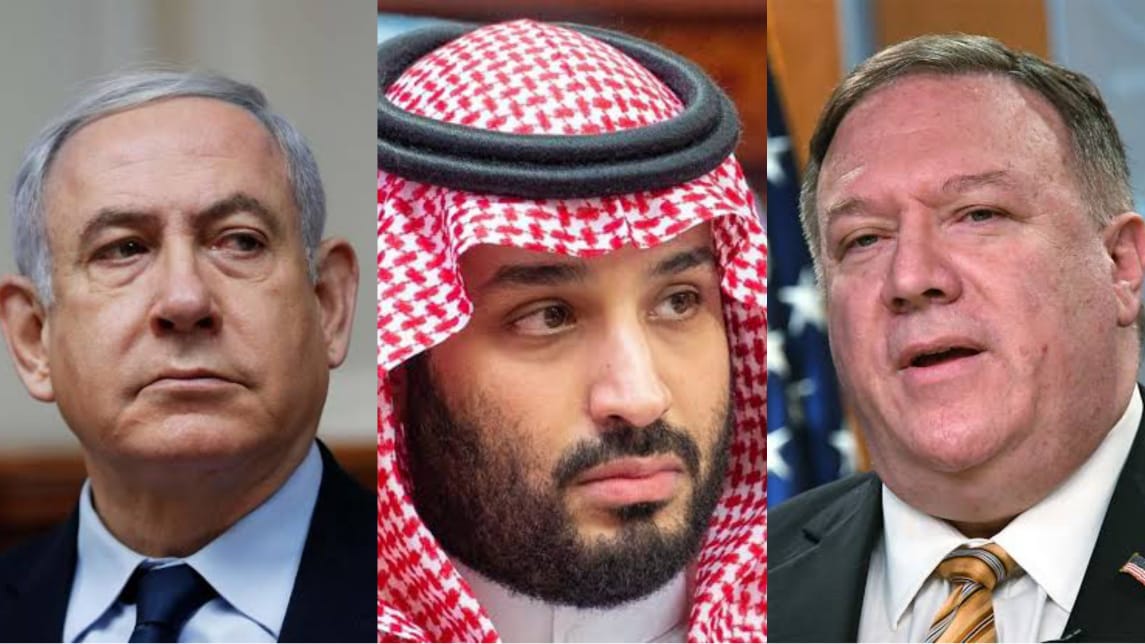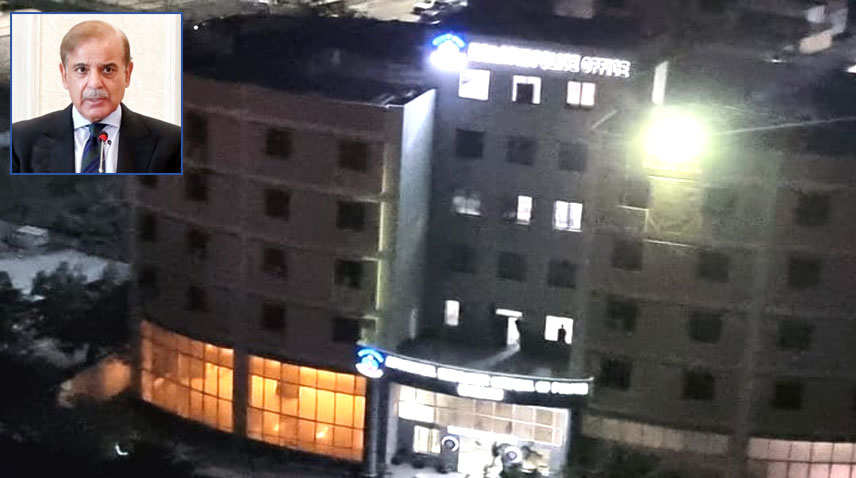News Desk
The Prime Minister of Israel, Benjamin Netanyahu has made an unannounced trip to Saudi Arabia to meet the Saudi crown prince, Mohammed bin Salman, and the US secretary of state, Mike Pompeo, according to an Israeli cabinet member.
The Sunday night visit marks the first reported meeting between leaders of the long-time foes, one that Israel has been pushing for in its efforts for regional acceptance despite previously being considered a far-fetched ambition.
Hebrew-language reports, citing unnamed Israeli officials, said Netanyahu was accompanied by Yossi Cohen, the head of the country’s Mossad spy agency. Saudi state media did not refer to a trip and the Israeli prime minister’s office did not respond to a request for comment.
However, if there was any agreement to keeping the meeting secret, possibly to save Saudi Arabia’s leadership from facing anger from its pro-Palestinian population, it was soon broken in Israel.
On Monday afternoon the education minister, Yoav Galant, a member of Netanyahu’s security cabinet and his Likud party, confirmed the face-to-face had taken place.
“The very fact the meeting happened and was outed publicly, even if half-officially right now, is a matter of great importance,” Galant told Israel’s Army Radio.
Netanyahu has long promoted himself as a politician who can boost Israel’s standing in the region without giving concessions to the Palestinians.
Flight tracking data showed a private jet previously used by Netanyahu took off from Tel Aviv to Saudi Arabia’s Red Sea city of Neom, where Prince Mohammed and Pompeo had a scheduled meeting, on Sunday night. The aircraft remained in the city for a few hours before returning to Israel.
Pompeo was travelling with American reporters on his international trip but left them at Neom airport when he went into his visit with the crown prince.
Later, without mentioning Israel, Pompeo tweeted that he had a “constructive visit” to Neom. “The United States and Saudi Arabia have come a long way since President Franklin Delano Roosevelt and King Abdul Aziz Al Saud first laid the foundation for our ties 75 years ago,” he said.
Separately, one of the Israeli prime minister’s social media aides, Topaz Luk, appeared to hint at the Saudi meeting by tweeting that Netanyahu was “making peace” while his former domestic rival, Benny Gantz, was “doing politics”.
Gantz had on Sunday appointed a committee to investigate the government’s controversial £1.5bn purchase of German submarines. Several associates of the prime minister, including his cousin, have been named as suspects in an ongoing investigation, known as Case 3,000, although Netanyahu is not a suspect and denies wrongdoing.
The committee could look into allegations that Netanyahu behaved improperly and had conflicts of interest. Israel’s longest-serving leader is already battling three other corruption cases in court, on charges he denies.
Gantz left opposition this year to become defence minister in a Netanyahu-led coalition, but their partnership has been beset by infighting. Despite their differences, Gantz has supported Washington-brokered deals made by Netanyahu with two other Gulf states, the United Arab Emirates and Bahrain.
While a similar deal with the regional powerhouse Saudi Arabia remains out of reach, Sunday’s trip in itself would mark a serious diplomatic win for Israel. Although the country shares a common enemy in Iran with Saudi Arabia and other Arab states, the continued occupation over Palestinians has left Israel isolated in the Middle East.
The Saudi kingdom’s official position, and that of the Arab League, is that Israel would only receive “normal” ties in return for a statehood deal with the Palestinians.
As the birthplace of Islam and due to its regional diplomatic dominance, the Gulf nation has been a key player in past decades to promote the Palestinian cause. Still, its relations with Israel have quietly warmed in recent years, led by its de facto leader, the 35-year-old Prince Mohammed.
In September, after Trump’s son-in-law and senior adviser, Jared Kushner, met with Mohammed in Riyadh, Saudi Arabia approved the use of its airspace for Israeli flights.
Kushner has developed a rapport with the crown prince, a relationship that has made the Palestinian leadership distrustful of its ally.
The Trump administration, which is close to Netanyahu, has made efforts in its final weeks to bolster the hardline Israeli government, both with diplomatic and symbolic gestures.
Earlier on his trip, Pompeo became the first top US diplomat to officially visit an Israeli settlement in the West Bank, a clear nod to the nationalist settler movement that has taken land in the occupied Palestinian territories.
Meanwhile, Washington has been hoping for other Arab countries to agree to formal relations with Israel. In October, after announcing a deal that may lead to Sudan fully normalising ties with the Jewish state, Trump said other Arab governments were open to the idea.
“[We] have many, many more coming. We have – they’re coming at us hot and heavy,” he said




